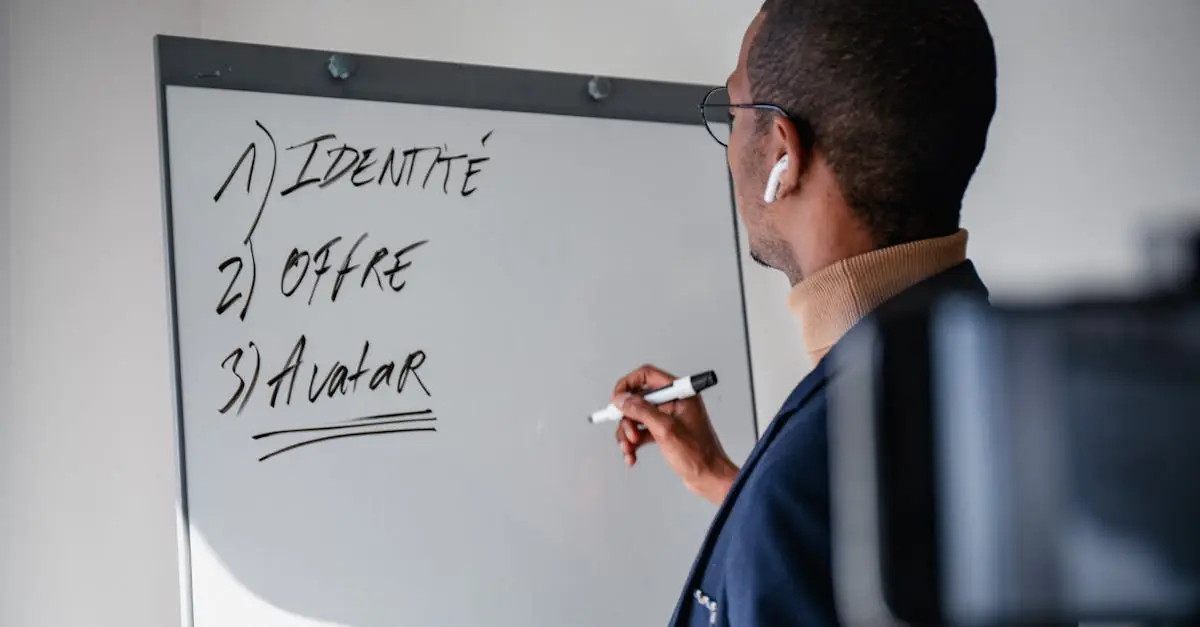In a world overflowing with information and constant distractions, critical and creative thinking skills have become the superheroes we never knew we needed. They swoop in to save the day, helping individuals navigate complex problems and generate fresh ideas. Imagine facing a challenge armed with the power to analyze, evaluate, and innovate—all while keeping your sanity intact. Sounds like a superpower, right?
Table of Contents
ToggleOverview of Critical and Creative Thinking Skills
Critical thinking involves analyzing information systematically. Individuals assess arguments and evaluate evidence to form well-reasoned judgments. Identifying biases and recognizing logical fallacies enhances decision-making.
Creative thinking fosters innovative problem-solving. This skill encourages brainstorming and generating novel ideas. Associative thinking and divergent pathways lead to unique solutions.
Both skills, when combined, provide a comprehensive approach to tackling challenges. Critical thinking clarifies the problem while creative thinking generates possibilities. Together, they enhance adaptability in complex environments.
Employers increasingly value these skills. They recognize that employees equipped with critical and creative thinking contribute more effectively. Effective communication and collaboration also benefit from these abilities.
In education, teaching methods emphasize fostering these skills. Engaging students in projects and discussions promotes applied learning. When students practice these skills, they develop confidence in their analytical and inventive abilities.
Various strategies enhance critical and creative thinking skills. Encouraging questioning and open dialogue stimulates deeper understanding. Practicing reflection and metacognition helps individuals become aware of their thought processes.
Results from studies indicate that incorporating these skills improves academic and professional outcomes. Individuals proficient in critical and creative thinking navigate challenges with greater ease. Broadening perspectives and fostering innovation becomes achievable through deliberate practice.
Importance of Critical Thinking
Critical thinking is essential for making informed decisions and strengthening overall problem-solving abilities. It enhances individuals’ capability to navigate complex situations effectively.
Benefits in Decision Making
Critical thinking enhances decision-making processes significantly. By systematically evaluating information, individuals arrive at well-founded conclusions. This skill enables them to identify potential biases, assess arguments, and recognize logical fallacies, leading to informed choices. Employing critical thinking skills results in higher-quality outcomes, as decisions stem from robust analyses. Organizations especially benefit, seeing improved effectiveness and efficiency when teams utilize critical thinking in their processes.
Role in Problem Solving
Problem-solving capabilities greatly improve with critical thinking. Addressing challenges becomes more manageable when individuals define problems clearly and explore various solutions. This skill encourages the generation of creative approaches, resulting in innovative resolutions. Consequently, critical thinking opens avenues for unique ideas and perspectives, fostering a collaborative environment. With effective problem-solving strategies, teams also achieve greater adaptability in dynamic contexts, ultimately leading to increased success.
Importance of Creative Thinking
Creative thinking plays a vital role in problem-solving and innovation. It opens doors to unique perspectives and new possibilities, facilitating progress in various fields.
Encouraging Innovation
Innovation flourishes through creative thinking. This type of thinking inspires individuals to explore unconventional ideas, often leading to groundbreaking solutions. Companies that foster this mindset cultivate a culture of experimentation, boosting overall creativity. For example, organizations like Google and Apple emphasize creative brainstorming sessions to encourage their teams. Such environments lead to continuous learning and discovery, setting the foundation for future advancements.
Enhancing Adaptability
Adaptability improves significantly when individuals engage in creative thinking. Being open to new ideas allows for quick pivots in response to changing circumstances. In fast-paced industries, those who think creatively can adjust strategies based on emerging trends. Opportunities arise from challenges when creative thinkers analyze problems from different angles. This flexibility not only enhances individual performance but also strengthens team dynamics, making organizations more resilient in the face of uncertainty.
Methods to Develop Critical Thinking Skills
Developing critical thinking skills involves structured approaches and practical exercises that foster analytical capabilities.
Educational Approaches
Engaging students through project-based learning enhances critical thinking. Interactive discussions encourage questioning and exploration of diverse viewpoints. Teaching methods that use real-world scenarios make concepts relatable. Furthermore, incorporating debates helps students evaluate arguments and identify biases. Active learning strategies, such as group work, promote collaboration and idea exchange. Teachers who emphasize reflective practices reinforce students’ understanding of their thought processes. These educational approaches collectively contribute to developing robust critical thinking skills.
Practical Exercises
Practicing critical thinking through practical exercises strengthens analytical skills. Participants can solve puzzles or play strategy games that cultivate decision-making abilities. Role-playing different perspectives during discussions deepens understanding of various arguments. Another effective method is analyzing case studies, which allows for real-life scenario evaluation. Creating mind maps helps visualize relationships between ideas and supports comprehensive analysis. Regularly journaling thoughts on specific topics fosters self-reflection and clarity in reasoning. Implementing these exercises consistently leads to improved critical thinking capabilities.
Methods to Develop Creative Thinking Skills
Creative thinking skills can be cultivated through various effective methods. Engaging in specific techniques promotes innovation and opens the mind to new ideas.
Brainstorming Techniques
Brainstorming encourages uninhibited idea generation. It involves gathering a group of individuals to share thoughts without criticism. Each participant articulates their ideas freely, leading to diverse perspectives. Institutions routinely implement structured brainstorming sessions to enhance creativity within teams. A method called “round-robin” brainstorming ensures everyone contributes, preventing dominant voices from overshadowing quieter members. Another approach, “brainwriting,” allows individuals to write down ideas before sharing, promoting thoughtful participation. Anonymity can also foster candor, leading to more innovative outcomes. This collaborative process frequently results in unexpected solutions when combined with critical evaluation later.
Use of Mind Mapping
Mind mapping aids in visually organizing thoughts and ideas. This technique utilizes diagrams to connect related concepts, enhancing comprehension and retention. Starting with a central theme, individuals branch out into subtopics, creating a visual representation. Each branch can include keywords or images, making information more relatable. Mind mapping stimulates both sides of the brain, fostering creativity and logical thinking simultaneously. It serves as a valuable tool for brainstorming, showing relationships between ideas. Many educators and professionals use mind maps to facilitate discussions and project planning. Regular practice can significantly improve creative thinking capabilities and overall problem-solving efficiency.
Critical and creative thinking skills are indispensable in today’s fast-paced world. They empower individuals to tackle challenges with clarity and innovation. By honing these skills, people can enhance their decision-making abilities and foster a culture of collaboration and adaptability.
Organizations that prioritize these skills not only improve their problem-solving capabilities but also create environments that encourage experimentation and growth. Investing in the development of critical and creative thinking will yield significant benefits in both personal and professional realms. As the landscape continues to evolve, those equipped with these essential skills will undoubtedly thrive and lead the way in driving meaningful change.

